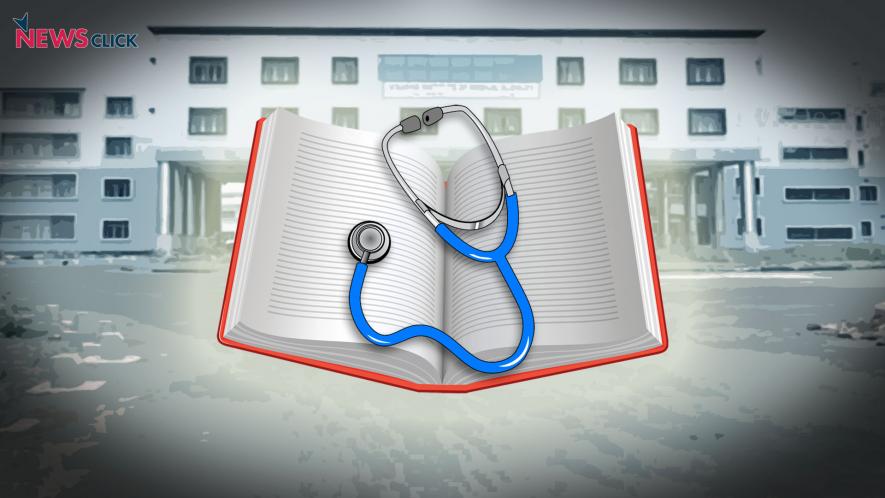Medical Education in India: Going from Bad to Worse?

Newsclick Image by Nitesh Kumar
The BJP-led NDA government is all set to table the National Medical Commission (NMC) Bill—which will steer medical education and practice in India—in the ongoing winter session of Parliament. The Union Cabinet on 15 December had approved the draft Bill, which seeks to replace existing Indian Medical Council Act 1956.
Once the legislation is enacted, the Medical Council of India, which currently regulates medical education and hospitals in the country, will be dissolved and the National Medical Commission (NMC) will take its place.
The MCI has been riddled with charges of corruption over the years, primarily in connection with granting recognition to private colleges.
But the draft NMC Bill, in the name of ensuring transparency and “outcome-based monitoring”, is geared towards further deregulating the environment for private medical colleges.
In March 2016, the report of the Parliamentary Standing Committee on Health and Family Welfare, submitted to the Rajya Sabha, severely indicted the MCI for its rampant corrupt practices.
The report said that the medical education and profession in India was suffering from “total system failure”. It recommended an overhaul of the system of regulation of medical education and medical ethics in the country. In May 2016, the Supreme Court too strongly criticised the MCI and had even appointed a three-member expert committee to oversee the MCI’s functioning till the government worked out the solutions.
The draft NMC Bill was prepared by a four-member committee of Niti Aayog in 2016, and was based on the recommendations of the Parliamentary Committee Report. It was modified in July 2017 by a Group of Ministers (GoM) that was constituted to take a “relook” at it.
The Parliamentary Committee Report had been extremely critical of the self-regulation that the medical education fraternity enjoyed as it got to elect members from among itself to the MCI. The report said these elected MCI members favoured the interests of private medicine and private doctors’ lobbies.
But instead of going the way of true democratisation, the draft Bill seems to traverse to the other extreme.
The proposed 25-member NMC almost entirely does away with government-nominated members – reducing them to five. The rest of the members will be government-selected and ex-officio members. This move has predictably been opposed by the Indian Medical Association, the largest private doctors’ association.
However, it is clear that the Modi-led government wants to entirely control the medical regulator, by turning it into an “appendage of the government”, to quote Dr Amit Sengupta of the People’s Health Movement.
“The MCI, over the years, has become a den of corruption because political patronage provided by some political parties led to the capture of the MCI by corrupt private practitioners. Instead of attracting professionals of high calibre, the MCI came to be run by a coterie that was secure in the belief that they would be protected by politicians and bureaucrats at the highest levels,” says Dr Sengupta.
“Reform of the MCI could have meant true democratisation of the apex body for regulation of medical ethics and education, by making space for professionals, academics and social activists,” he says.
“An MCI that is run as an appendage of a government wedded to the advancement of neoliberal reforms is an ideal foil to further reforms in medical education that are designed to service the needs of the corporate sector.”
There are several other provisions that are meant to aid in this endeavour. The most worrisome among them include that colleges can start post-graduate courses and increase intake of students all on their own – without seeking permission from the NMC.
Moreover, colleges will not need to renew licences.
The neoliberal agenda is again implied as The Hindu Business Line quoted an anonymous official as saying: “Opening up the medical education sector will lead to significant addition in the number of UG and PG seats and substantial new investment in this infrastructure sector.”
More appallingly, the NMC Bill does away with stringent penalties. If a college fails to meet the requirements, there will be no penalties like not renewing the licence of the college or not allowing the college to admit new students.
Instead, the offending college will only need to pay a fine up to 10 times of its annual tuition fee.
Another problematic provision in the name of regulation, which will encourage the profiteering ways of the private medical colleges, is that the NMC will give a free hand to private institutions to determine fees for up to 60% of seats. The NMC can prescribe fees for up to 40% of the seats. Given the shocking and predatory ways of the private medical establishment, this 40% cap is not likely to provide any relief.
Get the latest reports & analysis with people's perspective on Protests, movements & deep analytical videos, discussions of the current affairs in your Telegram app. Subscribe to NewsClick's Telegram channel & get Real-Time updates on stories, as they get published on our website.























